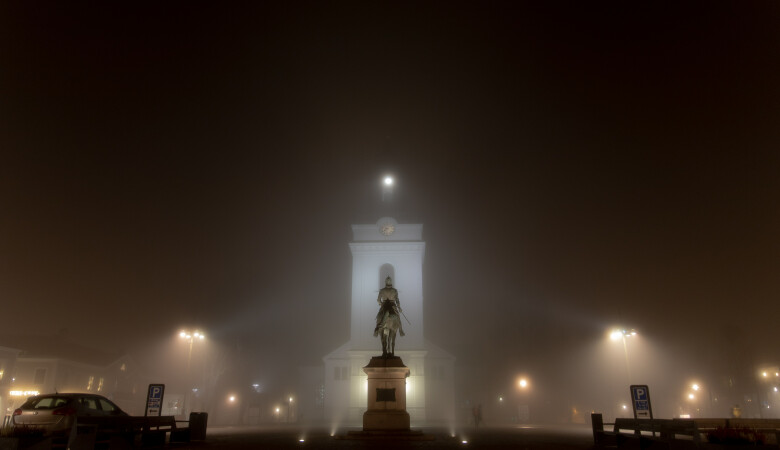Wake Up and Do It Now -- The Time Is Short (Romans Sermon 102 of 120)
May 28, 2006 | Andy Davis
Romans 13:11-14
Holiness
Introduction: The Passage of Time
This morning we're looking at Romans 13:11-14. Throughout history, humanity has been ingenious about the marking of time. We have been ingenious and developed amazing systems to mark the passing of time. Now, of course, from the beginning, God established the great time keepers in the sky. Genesis 1:14, And God said, "Let there be lights in the expanse of the sky, to separate the day from the night, and let them serve as signs to mark seasons and days and years." And so the movement as far as we're concerned, of the sun across the sky mark the passage of one day. There's evening and there is morning the first day, and so we see the passage of a day. And then again the rhythm of the moon from full to new moon and then back to the full moon again, somewhat mark the passing of a month, although not precisely. The challenge of getting an exact calendar is one of the great achievements of the ancient world, because there were not exactly 30 days in a month, or exactly 360 days in the year.
But we saw with the passing of seasons, winter spring, summer, fall, the turning of the years. Now, it wasn't until man developed the sundial, that we're able to take one day and break it into smaller portions. And mark the passage of time by the tracing of a shadow across the face of the sundial. As a matter of fact, the ancient Romans were so in love with these sundials that they actually carried around pocket sundials. I don't know how that would work, how you would hold it, etcetera. I prefer our wrist watch today. But they established the sundial as somewhat a form of the marking of passage of time, during the day. Now of course sundials had their problems, but it was nothing compared to the marking of the passage of time at night. How are you going to mark the passage of the hours? For example, a watchman standing on the wall, and he needs to know how much is left of the night.
And so man developed various ways of answering this problem. The first answer were water clocks. And so there would be bowls with a certain size hole, and the water would flow out of the bowl, and it would measure a certain number of hours. The problem is the bowl, the hole got larger and larger. It would wear out and so it was inaccurate. Also water changed depending on the temperature and it wouldn't flow evenly. So then they developed hour glass, is the flow of sand, which was more impervious to temperature and all that. The problem is you had to be there to turn the thing over when the last grain of sand fell through, and that was inconvenient. Charlemagne developed a 12-hour hour glass filled with sand, but it was so heavy no one could turn it. And so, great ingenuity was shown in the development of water clocks and sand clocks. It's really quite an amazing thing.
It wasn't until the development of the mechanical escapement, which enabled force to be transferred, intermittently to a gear and the swinging of a pendulum that things got really accurate. Up to that point, the passage of time had been marked somewhat like a river, the flowing of something from a bowl into another bowl from the upper part of the hour glass down into the lower part. It was a little bit like a river. But ever since the 18th century, it's been marked more like a certain pockets of action, tick-tock, tick-tock, and that's what we're used to. And we've been that way ever since. We don't see time like a river flowing but rather certain things that happen. Points of action.
As a matter of fact, I can't stand that sound, and I frequently take the battery out of our quartz clock so that I don't have to listen to the passing of time. Any of you have been to my office, you see a beautiful octagon drop clock on the wall. It hasn't moved in seven and a half years. People get nervous, they look up and they say, "Oh my goodness," they think for sure they're late or they're incredibly early. But I didn't like to be constantly reminded by the tick tock of the passing of time. Now, man's ingenuity kept on moving, the vibration of the quartz in the middle of the 20th century. Now we're in the atomic age where literally if you look up the definition of a second, it's certain number of vibrations of the cesium atom. Who could ever know that? For me, I just click on the internet and it tells me the atomic time. Exactly perfect. But for all of his genius at marking the passage of time, man, has never been able to discover the answer to this mystery; how much time is left?
How much time is left? Now that we do not know. That is a mystery that God holds in His hand, and He will not tell us. But what he does tell us in this passage that we're studying today is, it's later than you think. Time is passing quickly. It will not be long before every one of us is quitted this life and we are standing before God on Judgment Day. It will not be long before this present age as we know it will end, it is later than you think.
About 35 centuries ago, the man of God, Moses, wrote in Psalm 90, "Teach us to number our days aright that we may gain a heart of wisdom." I don't know how to do that. I don't know how to measure the number of days I have left. And therefore the heart of wisdom for me is to assume that today might be my last day on earth, and that I should make the most of the hours I have today, to live them to the fullest to the glory of God, and to me I think that's the burden of this text. Look at Verse 11 and 12, it says, "And do this, understanding the present time. The hour has come for you to wake up from your slumber because our salvation is nearer now than when we first believed. The night is nearly over the day is almost here, so let us put aside the deeds of darkness and put on the armor of light."
I. The Call for Personal Holiness
Now, what is Paul doing here? Well, look what it says right in verse 11. "And do this, understanding the present time." What is he referring to? Well, it's a call for personal holiness. The "do this" at the beginning of verse 11, looks back at the previous verses. Look at verses 9-10, it says, "The commandments; Do not commit adultery, do not murder, do not steal, do not covet, and whatever other commandment there may be are summed up in this one rule. Love, love your neighbor as yourself. Love does no harm to his neighbor, therefore, love is the fulfillment of the law, and do this understanding the present time." It really has to do with living a life of love, it has to do with fulfilling the commandments of God, in a life of love both to God and to our neighbor.
Now what is the context of Romans 13:11-14. Well, it's in the Book of Romans. The book of Romans was written by the Apostle Paul to explain to us the gospel, it is a synopsis of his gospel doctrine. And in this he explains how it is that the sovereign God, the holy God, take sinners like us and redeems us by the blood of Christ, through faith alone. And how He gives us the indwelling Holy Spirit and how He sets us on the path of His commandments that we may walk in newness of life. And how in the end, He will finish His redemptive work in us, that we might be glorified. Romans 8, that we might be transformed and part of a whole new creation with our resurrection bodies. It is the whole salvation story.
Romans 1-11, lays down the doctrine, makes it very plain and clear that the foundation of our hope before God is the blood of Jesus Christ shed on the cross. The foundation of our personal daily holiness is the indwelling spirit, and the fact that God has written His laws in our minds and on our hearts, and by the power of the Spirit, we can walk in it. This is the context. Romans 12 through 16 is the everyday life application of this doctrine. We saw in Romans 12, life within the body of Christ, how we're going to live using our spiritual gifts and loving each other and serving each other. Romans 13, perhaps life outside of the body of Christ, with secular government, and dealing with the sinful world. That is the context of what we're looking at.
Now, God's holiness is the pattern here for our holiness, I already heard read so beautifully Isaiah 6, how powerful is that? The vision that Isaiah saw of the risen Christ, the glorified Christ sitting on His throne, a vision he had of Christ. He saw the Lord seated on a throne, high and exalted, and the train of His robe filled the temple, and there were these seraphim, the Hebrew word means the burning ones, they are glorious, and they're calling to one another, as though they can't get enough of it, they are just so amazed at the holiness of God. Holy, holy, holy, they call to one another, and the whole earth is full of His glory, the holiness of God is our it's our pattern, it's our rule for life, it is also our future by grace amen and amen. He gives us His holiness as a gift. A gift of grace.
But it is also our call and we are called to be like God. We are created in Christ Jesus to be like God. We are renewed every day in our minds, transformed to be like Christ, that is the call on our lives and so He urges us to behave decently. Look what it says in verses 12-14. "The night is nearly over, the day is almost here. So let us put aside the deeds of darkness, and put on the armor of light. Let us behave decently, as in the daytime. Not in orgies and drunkenness, not in sexual immorality and debauchery, not in dissension and jealousy, rather clothe yourselves with the Lord Jesus Christ and do not think about how to gratify the desires of the sinful nature." This is a call for personal holiness. This is a call to live a heavenly life while still here on earth. It is a call to resist the constant pull of the world, the flesh and the devil. It is a call to understand the significance of every passing moment of every passing minute and day and year. A call to understand what God is calling on us to do and to be in this world, a call to be children of light, in the image of our father. As it says in 1 Peter 1, "Be holy because I am holy." That's what Paul is calling on us to do.
II. The Urgency of Personal Holiness
Now he gets to it by a matter of urgency, there's a sense of the urgency of the present time. This is an urgent call, for personal holiness. Look again at verses 11-12, and note the words of urgency. "And do this understanding the present time. The hour has come, for you to wake up from your slumber, because our salvation is nearer now than when we first believed. The night is nearly over, the day is almost here." Do you see these words, almost, nearly, it's here, it's coming. There's a sense of urgency. Now that's what this is about. A sense of urgency, pervades this passage, Paul wants us to feel that the time is running out. There's less of it than you might imagine. And so we have to understand time from God's point of view.
Now, God created time, He created the concept of time, the passage of time. Minutes and hours and days and months and years, they serve God's unfolding redemptive plan. There's a purpose to it all, God owns it, He made it and there's a purpose to it. And that is the advancement of the kingdom of Christ. Now, as Christians, we believe that history is linear, it's moving from point to point to point. We are not like the Hindus who believe that history, that time is a big circle, it's going around and round, the cycles of reincarnation and karma. We don't believe that, we believe in the linearity of history. It moves from point A to point B to point C. We can even use that language for Jesus, our Lord, said at the end of the Book of Revelation. Revelation 22:13, He said, "I am the Alpha and the Omega, I am the first and the last, the beginning and the end." That's linear. And Jesus said it, so I would think we'd want to go to Jesus and say, "Teach us about time." Don't go to your physics professors or your philosophers. Let Jesus instruct you. Time is linear. "I am the Alpha and I will be the Omega." Time is linear, it's moving. But Paul's basic concept here is it's later than you think it's not the Alpha day. No, it's not the Omega day yet, but it's further along than you think.
Crush Procrastination, for The Hour Has Come
And so at last, we come to the sin of procrastination. Been meaning to talk to you about it, but I've been putting it off until now. Seem like a good time to talk about it now though. How many of you struggle with that? Don't raise your hand and don't shame yourself. But how many of you struggle with the idea of; I've been meaning to do something and I just keep putting it off. How many of you wrestle with the fact that you look at some things that just seem too difficult, and you just don't want to do it. They call it task avoidance.
Jonathan Edwards, preached a sermon on procrastination, procrastination, the sin and folly of depending on a future time, depending is the key word in the sermon. Now he's very balanced in the sermon, he says, we need to like the ant lay up in the summer for the coming winter. We need to make provision for that. But the idea is spiritually we ought not to depend on a future day because it might not ever come. His text there was Proverbs 27:1. "Do not boast about tomorrow for you do not know what a day may bring forth." Don't boast about it as though it's already yours. "We ought," says Jonathan Edwards, "to behave ourselves every day as though we had not dependence on any other day." It kills procrastination. Don't put off to tomorrow spiritually what you ought to be doing today. Now, what could that be? Well, here I think he's seizing the day or seizing the moment in the matter of personal holiness, but we in this church called that internal journey of growing in grace and the knowledge of Christ. He's seizing the moment in the matter of personal holiness, the flesh is always making excuses. Isn't it? Putting off to tomorrow, saying, Oh, you'll get to it by and by. Holy Spirit may convict you of a matter of personal holiness, He wants you to address it now.
Do not imagine He's telling you everything. He isn't. Have you ever noticed that? You could go years blind to a certain area and then the Spirit brings illumination. And now it is time to deal with it. If the Spirit has brought illumination on many points you need to deal with all of them, whatever He has brought to your imagination, to your mind. It's a sense of urgency in the matter of personal holiness. Perhaps it's a spiritual discipline you've been meaning to start. You always thought at some point you would memorize a book of the Bible, you imagine that you would. Or, perhaps you always imagine that your family would be the kind that would have regular family devotions. Perhaps you imagined that you'd be the kind of person who would get up every day and have a regular quiet time. A meeting with your heavenly Father as Jesus did early in the morning. Perhaps you imagined yourself and you always could see yourself as the kind of person who would do that, but you know what, it's been years now. It keeps moving on. It's later than you think.
It's the issue of procrastination or perhaps it's a deadly sin pattern in your life. You fancy yourself some time in the future, when you'll be clean of it at last. I'm not talking now about in heaven when we will be at last free of all death, mourning, crying, and pain, and all sin. But I mean, you think of yourself even in this world, at some point in the future, you'll be free of that particular sin habit. Now it's later than you think. Perhaps it's an over-eating, a problem with overeating or with lust, or laziness, or pride or selfishness. You imagine at some point, you will effectively put it to death by the Spirit. But you know, the days just keep passing and nothing is done. Or, perhaps it's a matter of witnessing, somebody that God has laid on your heart. He's calling on you to be a witness. A co-worker, a relative, mother or father, a child. Somebody in your life, a neighbor. And he's calling on you to reach out with the gospel and you'll get to it by and by, but you never do, it's later than you think.
In our home fellowship, we were studying Randy Alcorn's book: Money, Possessions and Eternity. And he told a rather devastating story about an actress named Lisa Whelchel, perhaps you know the name, and she was in the popular TV program, Facts of Life. And she said that she heard a Christian speaker talking about thousands of starving children in Haiti. Her eyes were immediately opened at that point to what a selfish and privileged life she'd been leading. She was 18 years old. At the end of the service, she went to the front of the church, she took off her Rolex and an emerald ring she had and put it in the speaker's pocket and said, "Sell it and give it to the poor." She then went home filled with all kinds of zeal to look at different areas of her life, and this is what she said, "I decided I could live on 10% of my salary, I decided to sell my condominium and rent a simpler apartment more appropriate to my needs. I felt it was no longer necessary to drive around in a Porsche, selling the car and buying something more reasonable would free up thousands of dollars for the Lord's work. I had money invested in real estate across the country. If I sold it the money would feed tens of thousands of children it was a no-brainer. My Zeal was strong, I knew I had heard from God and was doing the right thing."
So what happened? Well, some Christian friends found out what she wanted to do and talked her out of it. They said she wasn't behaving wisely, she needed to be a good steward. She needed to think about the future and consider. She needed to wait some, pray it through consider. She ended up doing none of it. None of it. This is what she said, "Less than 10 years later, all that money was gone anyway. A chunk of it had been invested in a high-rise office building in Pittsburgh that went belly up. Another significant portion was in Texas land that dried up during the oil crisis and was eventually foreclosed upon. When I got married I sold my condo and bought a house in the California real estate boom in the 1980s, only to give it back to the bank three years later when the bottom fell out of the market. The Facts of Life TV show was cancelled and I spent all the cash I had left making payments on everything for as long as I could. At 28 I was broke."
She had at that moment, when she was 18, a window of opportunity. The Scripture says, "Today, if you hear His voice, do not harden your hearts." And she didn't follow, she procrastinated, she imagined in the future she would get to it and she never did. And you know what? It was taken from her. All of it. The call in this text is for us to wake up. Look at verse 11, it says, "The hour has come for you to wake up from your slumber." The King James Version puts it this way, "Now it is high time to awake out of sleep." Don't you love that? It's high time to wake up from your slumber.
The Slumber is a Metaphor for the Devil’s Work on Our Souls
Now the slumber, I believe, is a metaphor for the devil's work in our lives and in our minds. Slumber, the Greek word for slumber here is hypnos from which we get hypnotize. And so the devil's hypnotizing us about this matter of time and how we're spending our lives. And we're somewhat in a daze, kind of a stupor coming over us where it's like we're slumbering. In the midst of a battle we're just standing there hypnotized, and we don't seem to realize what everything is about. Satan deceives us on the matter of the urgency of personal holiness. He deceives us in the matter of the urgency of personal evangelism and witnessing mission's work. He puts us into a slumber, a sluggish-ness.
I've got two illustrations of this from the literary world. The first is the great story, The Hobbit, by Tolkien. Bilbo Baggins is there with 12 dwarves and they're on their way on some errand. It's an incredible story, but nothing like Lord of the Rings which is so much higher and more intricate, but it's a great story nonetheless. And there he is with these dwarves, and at some point they stumble into these woods where these monstrous huge spiders capture the dwarfs and sting them all with spider poison and wrap them up with sticky webbing and let them hang there to eat them later. Fresh meat for the monstrous spiders. And Bilbo has to rescue them with his little sword and he does. But they're all sluggish and in a stupor, almost... Well, they're drugged by the poison, the spider poison. That's a picture of us and the work that Satan would like to do in us, we're all just kind of waiting to be devoured. We're in a stupor, sluggish, as though nothing were urgent, nothing really matters. We're very mellow a society. There's a time for urgency and the text is saying it's now.
Another illustration is from Bunyan's Pilgrim's Progress. The allegory of the Christian life where the main character Christian is moving from the City of Destruction on to the Celestial City. It's an allegory of the Christian life. Shortly after he comes to the cross and he loses his burden, he's given a scroll which scholars say represents His assurance. And he looks in it frequently for comfort and consolation. Anyway, soon he comes to this place called The Hill Difficulty, and he's making his way up the hill and it's tough, it's hard. And half way up he finds a shady arbor, a little tree place with a little bedding where he can just rest and be refreshed temporarily. And so he settles in there, but as one thing has it, he falls into a deep slumber and he sleeps away the rest of the day. And finally someone, it doesn't say who, comes to him, perhaps an angel, and says, "Go to the end, you sluggard. Consider its ways and be wise."
And he wakes up, and oh, he gets up and runs and continues his journey, makes it up to the top of the hill difficulty, continues on, but it's getting tough and the next trial comes along and he needs some consolation. And he reaches for that scroll that was in his possession until recently to read in it and then find some consolation, it's gone, he cannot find it anywhere. He doesn't know where it is. He's searching frantically. He retraced his steps. He has to go back halfway down the hill difficulty. Finally he remembers what happened, while he was sleeping he let it go. Well, he rejoices in finding his scroll again, but he laments over the wasting of the time. Now he has to retrace all those steps and now it's dark, it's dangerous and he laments bitterly, "Oh, that sinful sleep," he calls it. Oh, that's been so convicting for me. God has created from time to time pockets of rest and refreshment for us. And we end up staying there as though we're meant to live there forever.
Recreation, rest, relaxation, all of these things, R&R, they're meant to be these temporary shady arbors, and then we continue on our arduous journey, but instead we set up, say, "Well, I think, let's put the end table over there, I'll put the same way end up setting up. And we'll live there in the shady arbor." The sinful sleep. And the text is calling on us to wake up from our slumber. Satan is the druggist of that sinful sleep, isn't he? He's the apothecary, he's mixing that and handing it to us so we drink some more of it. And we're sluggish, we're sleepy. Rather than on edge ready to serve our commanding officer. Christians underestimate the seriousness of sin. They overestimate how much time they will have to deal with it. And Paul says, "Wake up." He says, "Wake up, wake up." And why? Because the time is now. There's an urgency to time, it's later than you think. But he gives us a word of optimism here. Look what he says, I love this, I've already alluded to it.
Our Salvation Nearer Now
Verse 11, "The hour has come for you to wake up from your slumber because our salvation is nearer now then when we first believed." Isn't that sweet? All meditate on it, think much on it. Our salvation is nearer now than when we first believed. Not our condemnation, our salvation nearer now than when we first believed. Paul's logic is someday we're going to be fully saved from sin. We won't even see it around. There will be no temptations around. The world will be purged forever, from everything that causes sin and all those who do evil. That's what it says in Matthew 13. It will be a free pure world, and we will be fit for it and ready for it. That's our salvation, it's a complete salvation from sin.
Martyn Lloyd-Jones used an illustration of the closing days of World War II in a prisoner of war camp. Perhaps up to that point, the prisoners in the POW camp had been maybe collaborating at small levels with the German soldiers, maybe they've been acting in certain ways just to get by. Perhaps they were contemplating risky escape attempts or bribing the guards or doing some other things just to survive. But a short wave radio is smuggled into the camp and they find out that major victories have been won by the allies and frankly the troops are no more than four, five miles away. They're going to be liberated within the week. They start to celebrate. This is the time to act like somebody who's about to be released from prison. Our salvation is near now, nearer than we first believed. So why would we act like sinners? That's what we're being saved from. That's Paul's logic here in the passage.
What I get out of this, is that any effort we make in personal holiness, and I could add in from other places, any effort we make in worldwide evangelization will prove fruitful because God is in them. God is saving us from sin, and so when we wake up from our slumber, when we put sin to death vigorously by the power of the Spirit, when we move out in new areas of service to Him, God will bless that energy. He will bless the movement because he is in it. Now, what lessons do I get out of this phrase, "Our salvation is nearer now than when first believed." Well, first our salvation is incomplete, it's not done yet, we're not fully saved. That shouldn't be shocking to your ears. I'm not in any way denying that we could ask the question, "Are you saved? I know the scripture speaks in that way, but we've got more salvation yet to come. Our salvation is still in the future.
Salvation from Judgment Day, when all the nations will be gathered before Jesus and He will sit on His throne and He will separate the people, one from another, as a shepherd separates the sheep from the goats. And he'll put the sheep on his right and the goats on his left. That is in the future. We need salvation on that day, don't we? We need to be saved from hell on that day and we will be through faith in Christ. So it's a future salvation. But also there's the ongoing work of sanctification, there's the transformation of our bodies, when we will receive glorified resurrection bodies. Our salvation is in the future, it's not finished yet, there's still work to be done.
Secondly, do you see the unspeakable precious nature of time? Time is precious, it's running out, there's not much more of it. It's nearer than when we first believed, it's moving, it's dynamic, we're moving ahead. And therefore number three, we are making sure and steady progress every day, every passing week to see in Christ face to face. Amen and Hallelujah. It can be sad to watch the passing of time. It can be sad for parents to watch their kids grow up. I've done a lot of weddings, and I've seen again and again parents cry at their children's weddings. Now, they will tell you it's tears of joy. Don't you believe it.
There's a feeling of death almost, the end of a phase of life that's precious to the mom and dad. It's sad, actually. I remember I was doing a wedding and I saw my little girl come walking down in this white dress and I had a vision of the future, and I thought, "Oh, no." It's not going to be long before that's me, that's her. And I actually started to cry and I said, "Wait a minute, I got to do the wedding here. I got to pull myself together. I can't crumble in the misery at the passage of time." So we watch our children grow up and their phases, their sweet little developmental phases, they don't last long. It's like the sunset, and then it's gone and it never comes back and you want to grab onto it. I actually have taught my kids bad grammar, their own bad grammar, to keep them from learning those right ways so they can stay young longer.
I admit it, my wife corrects it, she does, she's a good mom. But I'm just trying to hold on to something that I can't hold on to. It can be sad to watch the passage of time. And then just aging can be sad, losing capabilities. Things you used to be able to do, can't do it anymore. It can be sad. Christians should not be sad about the passing of time. This verse liberates us from sadness about the passing of time. Our salvation is nearer now than when we first believed. Amen, celebrate, every passing week brings us closer to seeing Jesus face to face. Come on, be happy, look happy, if you're a Christian. You're getting closer and closer. You're closer now then when I began this sermon. You know back in the 18th century, they actually put an hourglass over the pastor's head in some parishes. And it was someone's job to turn it once. Okay? I've got a clock right here, I know what time it is.
I know what progress we're making. But every moment brings us closer and closer to seeing Jesus. Closer and closer to being liberated at last from this dreadful sin nature. No more fighting with it. Amen and amen. Closer and closer to a resurrection body which will feel no pain or fatigue or weariness. Closer and closer to salvation. Oh, is that sweet? Do not lament the passing of time, but make the most of every day. These days are precious, you'll never live them again. Never, once they're gone, they're gone. Yes, you may have another Tuesday. But you'll never have this Tuesday again. Make the most of every moment. That's what I get out of this.
The Night is Nearly Over (verse 12)
And he says in verse 12, "The Night is nearly over." The night here, I think is satanic gloom of spiritual darkness that Satan has spread over the whole earth. It is now the age in the era of darkness, is it not? It's a dark era. The night that Jesus was arrested, he said to the chief priest and the guards and the elders, Luke 22:53, "Every day I was with you in the temple courts and you did not lay a hand on me, but this is your hour, the hour of darkness."
Oh, that's significant. "This is your hour, the hour of darkness." It's a dark dreadful time that Satan has cast over the earth. It's a dark age, but this verse tells me it's nearly over. The night is nearly over, the day is going to shine with radiance and glory. It's soon going to be over. All of it, over. The night also refers, I think, to deceptive concealment of sin. Most crimes happen at night when it seems like no one can see. It's a time of deceptive concealment. Why do I call it deceptive? Because nothing's hidden before the eyes or the One who really matters. We are the ones deceived by the night.
And so it says in Ephesians 5, "Have nothing to do with the fruitless deeds of darkness, but rather expose them, for it is shameful even to mention what the disobedient do in secret, but everything exposed by the light becomes visible for it is light that makes everything visible. This is why it is said, 'Wake up, oh sleeper, arise from the dead and Christ will shine on you.' Be very careful then how you live. Not as unwise, but as wise. Redeeming the time because the days are evil." Now disposed concealment of darkness is just a satanic trick of deception. Ever heard that saying, "What happens in Vegas stays in Vegas"? I've never leaned on that. I want you to know, okay. That's wickedness, isn't that? It's the idea that you can go to Vegas and do wicked things there and no one will find out. Well, no, what happens in Vegas is written down in God's book and you'll face it again on Judgment Day. There's no concealment possible. He sees everything. Psalm 10:11, The sinner "says to himself, 'God has forgotten, He covers His face and never sees.'" It's not true. He sees it all. Christians need to understand by faith that true concealment is impossible.
Jeremiah 16:17 says, "My eyes are on all their ways. They are not hidden from me nor is their sin concealed from my eyes." I see it all, everything. Jesus said this, Luke 12:1-5, we Christians need to listen to these verses. "Be on your guard against the yeast of the Pharisees, which is hypocrisy." That means looking good on the outside, but inside, wickedness. There is nothing concealed that will not be disclosed or hidden that will not be made known. Do you believe that? Do you believe every word of that? There is nothing concealed that will not be disclosed or hidden that will not be made known. What you have said in the dark will be heard in the daylight, and what you have whispered in the ear in the inner rooms will be proclaimed from the roofs. "I tell you, my friends," said Jesus, "Do not be afraid of those who kill the body and after that can do no more. But I will show you whom you should fear. Fear Him who after the killing of the body has power to throw you into hell. Yes I tell you, fear Him."
In Ezekiel 8, God brought Ezekiel on a Spirit journey into the depth, the bowels of the temple area. Through the walls where the elders of Israel were doing wicked disgusting things thinking that no one could see. God said, "Come on, I want to show you something." And he took him on a tour of the wickedness of Israel. I see it all. A Christian understands the deception of darkness is merely deception. We see the light by faith even though it is night, even though it seems no one can see what we do, we know by faith God sees it all.
Job put it this way in Job 31, "I made a covenant with my eyes not to look lustfully at a girl, for what is man's lot from God above, his heritage from the All Mighty and High. Is it not ruin for the wicked, disaster for those who do wrong? Does He not see my ways and count my every step?" In Hebrews 4:13 it says, "Nothing in all creation is hidden from God's sight, everything's uncovered and laid bare before the eyes of Him to whom we must give an account."
I believe as a pastor, it's my job by preaching the word in this manner to make the day, Judgment Day, bright in your minds and hearts. To turn on the light inside your soul so that you're not deceived by this deceptive darkness. And you live like you will wish you had lived on Judgment Day. You'll wish you had lived purely and holy, in a holy manner. It's my job to make that intense for you today, so that you are ready and you say with the apostle John, at the end of the Bible, Jesus said, "'Yes, I am coming soon.' Amen. Come Lord Jesus." It's soon. Soon and very soon you're going to be seeing Jesus. Are you ready? It's my job to make it intensely bright for you because that's what it's going to be like on Judgment Day. Be ready for it.
III. The Nature of Personal Holiness
Now, what is personal holiness? Well, what does he say? Well, there's a negative side to it. You're going to put off the deeds of darkness. Not in orgies and drunkenness, not in sexual immorality and debauchery, not in dissension and jealousy. These are some of the ugliest words in human experience. Rome was characterized by a flouting of natural moral laws. Sexual relationship within marriage wasn't enough, they needed an orgy. Eating food was not enough, they needed gluttony. A small amount of wine wasn't enough to gladden the heart of man, they need drunkenness. They were blowing through all of the barriers that God had set up. It was an age of excess just like ours. Paul says, "The time for these deeds of darkness is to be put off. Put off the deeds of darkness, those things will be ashamed of on Judgement Day. Put them off like a filthy discussing garment," that's the negative part.
Positively, put on the armor of light. Armor, like the Medieval Knights wore or like soldiers wear in Iraq. The body armor. The point of all armor is to prevent a vicious weapon from penetrating you and piercing your liver, your vital organs. Put on the armor of light, stand firm in the day of testing. Don't allow the temptation to hit your vitals, put on the armor of God, Ephesians 6. Specifically in this text it's, put on Christ. Know that Christ is your righteousness. Clothe yourself with the Lord Jesus Christ, put His perfection on you. And make no provision for the flesh to satisfy its lust.
I think about that often. Sin takes provision. It takes equipment. The drunker needs to know where to go to get his alcohol, the drug addict needs to know what is sources of the drug. The pornographic user needs to know what websites to go to. The one who wants to share gossip needs to know where to go in the office to hear the juicy tidbits so that he or she can spread them around. The person who wants to sleep in and not have his quiet time in the morning, needs to know to not set the alarm, he's making provision for the flesh. Turn off the alarm, don't get up. No, he says no. Put on the Lord Jesus Christ and make no provision for the flesh to satisfy its lust.
IV. Application
We have seen this morning an urgent call for personal holiness. I have a number of applications there on the back, but I want to share with you something that's transformed my way of thinking on this and then close with prayer. And some time ago when I was working as an engineer, I saw up on the wall of the office a year calendar. 12 months all in a row. January, February and March, all the way down to October, November, December. I have such a calendar on the back panel of your bullets and it's small, you can't really see it, but you know what I mean. You can see the whole year in one place. And I remember thinking as the year would go on, I would see it would be May, it'd be August. I could visually kind of make my way through the year. I remember at the end of June thinking, "Oh, we're halfway done with the year."
And one day a thought hit me. I said, "What if January 1st represented the day I was born and December 31st represented the day of my death. What month is it? Like I said, I have all kinds of ways to mark the passage of time, but I don't know how much time is left. Was it July for me? Was it October or was it December 30th? I had no way of knowing. That was sobering to me. But then I extended, I said, "Well, suppose that represented my time here at that company, at Grandmaster." January first, the day I was hired, December 31st, the day I left. Where am I in that? I had no way of knowing. It represented my marriage. January first, the day that we got married, December 31st, death parts us. I don't know where I am. I have no idea how many more months or years I have with Christi, no idea. Same thing with every one of my relationships with all of you, I have no idea. January first, the day I met you, December 31st, the day we're providentially parted.
I don't know, I don't know how much time is left. What does that tell me? Make the most of today, make the most of this afternoon with each other. Put aside dissension and jealousy and fighting and lust and all the evil things and make the most of it. If you're not a Christian, the most important thing you can do is come to Christ. You don't know you'll be alive tomorrow, make the most of today, make the most of right now by trusting in Jesus as your Lord and Savior. I don't believe that I'm preaching to a 100% regenerate audience. If today you hear His voice, come to Christ, come and trust in Him for your salvation. Close with me in prayer.






























